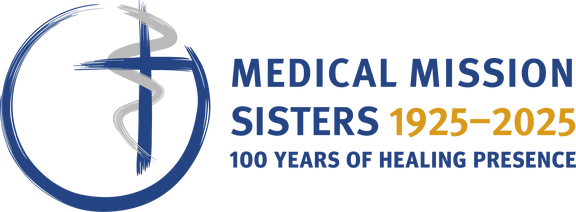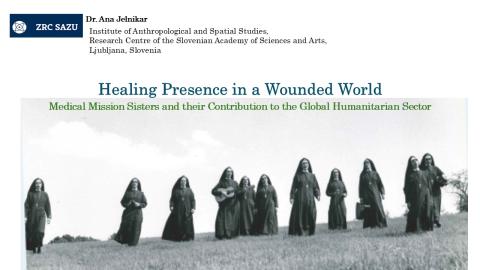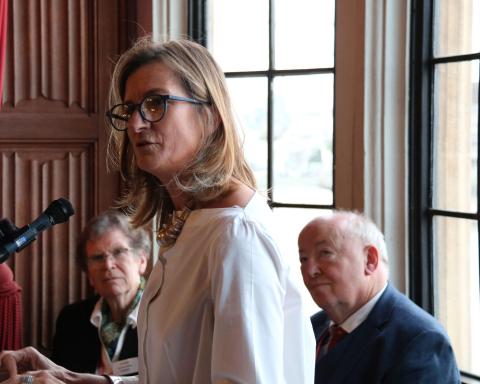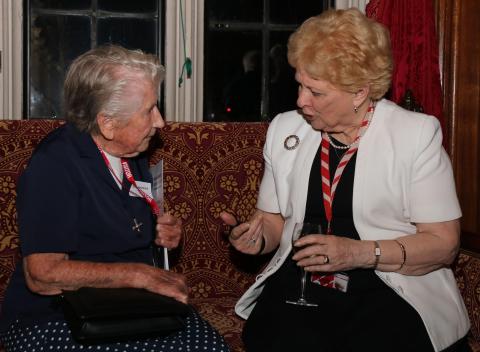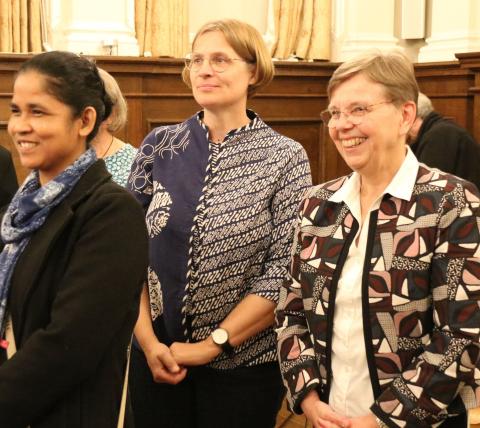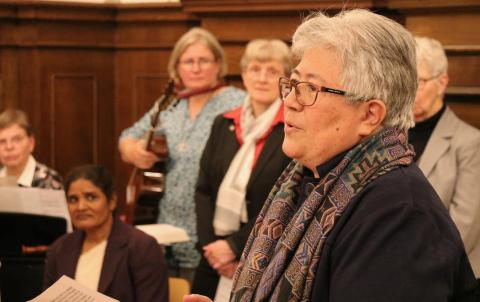Healing Presence in a Wounded World: Medical Mission Sisters and their contribution to the global humanitarian sector
On the 9th September 2025 in the River Room at the House of Lords at an event hosted by Baroness O'Loan, Ana Jelnikar made the following presentation on “Healing Presence in a Wounded World: Medical Mission Sisters and their contribution to the global humanitarian sector”.
"What does it mean to be a healing presence in the wounded world of today? This phrase comes from the poetic preamble to the current constitution of the Medical Mission Sisters, the first Catholic female congregation to combine medical professionalism with religious commitment.
To my knowledge no other religious congregation has used poetry to express their mission in a legal document, validated by the Vatican. This is the stanza in question:
We are called
to be a healing presence
at the heart of a wounded world,
to witness to the integrity of all creation,
and to build one world
where the gifts of all people,
all cultures,
all creation,
are affirmed and celebrated.
For women rooted in the biblical tradition of the Word made flesh, words and language matter. How can they incarnate the God of compassion and love? Seeing themselves as walking in the footsteps of their inspiration, Jesus Christ the Healer, MMS strive to embody what they preach, devoting their lives to working with the poor, mainly women and children, in areas with little access to healthcare. Both science and expert knowledge are as essential to their work as religious dedication. Neither should be compromised. With like-minded pioneering women doctors, and in a continuous, patient dialogue with Vatican, the foundress Anna Dengel persuaded Rome to change centuries-old Church laws, revolutionising the way the healing ministry was practised. The sisters also withstood the pressures of being co-opted by a male congregation—not because they were rebellious women, but because, as Anna Dengel, stated unambiguously in 1925, their “main idea” was “to do the work for God only, and with the necessary liberty”. She wanted “absolute freedom to develop”, knowing full well that “whoever finances has the power”.
Moreover, she heartened her fellow Sisters to “never be afraid to change” if change was what was needed. This fearless, dynamic, radical spirit of the foundress continues to inspire over 400 Sisters from 23 different nationalities and working across five continents, “to promote healing and wholeness in all aspects of life.”
The legacy of Anna Dengel is tremendous indeed. She understood that illness had deeper roots than a simple lack of medical care. She recognised the links between health issues and the social and economic circumstances of the local population. Long before medical care was formally recognised as a human right in the WHO Constitution of 1946 and the Universal Declaration of Human Rights of 1948, she was laying the groundwork for social justice in – and through – healthcare, advocating for medical care to be accessible to everyone, regardless of race, gender, religion, or social background. A true life-affirming stance presupposes an acknowledgment of, and deep respect for, difference. Conversion was never her priority, even in the early days of the congregation. The first mission hospital in Rawalpindi (now in Pakistan), for example, trained Muslim nurses, who remained Muslim, as well as Christian ones. Within a few years of its foundation, they were treating 150–200 inpatients and as many outpatients each day.
As the congregation grew, the Sisters went on to set up another base in Dhaka (now Bangladesh), where again they trained local midwives, made home visits, and opened four health centres. Within eight years, infant mortality in these districts had reportedly dropped to a third of that in surrounding areas.
Anna Dengel’s goal was to pass on and develop in others whatever would help them to help others. Over the years, this key tenet has resulted in 90 per cent of their hospitals, along with all the equipment, being transferred to local governance. This has become one of the cornerstones of their community-based participatory healthcare model, which empowers local populations to take responsibility for control of their health while also drawing on local knowledge and wisdom of medicine and healing. Today, most of the Sisters come from the local communities themselves, particularly in Africa, Asia, and Latin America. This makes them ‘insiders’ who understand local needs, cultural dynamics, and power structures in ways that external actors often cannot.
The Society has come a long way since its early years of establishing, staffing and managing hospitals in some of the most remote areas in Africa, Asia and Latin-America. Their approach has progressively shifted from curative medicine, which addresses individual symptoms, to a more preventive and holistic model of healing. Many Sisters today are highly experienced practitioners of alternative healing therapies alongside conventional medicine. They make it a point to learn from the local experience and knowledge systems, encouraging collaboration on an equal footing.
Safe water, sanitation and hygiene have become paramount, as have the pressing issues of climate change, migration and human trafficking, and their impact on health and healing. The Sisters advocate for systemic change everywhere, addressing the root causes of poverty and social injustice. In rural Africa and Asia, they run grassroots training programs for women to become community health workers, combining local knowledge with medical and ecological expertise. Over the years, they have empowered thousands of local women as well as men as health workers, educators, and community leaders—catalysing long-term social change.
The 1960s saw seismic shifts in the Society’s self-perception as it grappled with redefining the core of its medical mission. The Sisters became more involved with local populations and they expanded their mission beyond the unfortunately called ‘Third World’ to all continents, including Europe and North America. They went to the suburbs of Amsterdam, the homeless in Frankfurt and to the drug-addicts in Philadelphia. They saw the world as one. The Sisters wanted to lead without domination, which meant recognising their own vulnerability and breaking free from old patterns of thinking and behaving — a motto and modus operandi that they have upheld to this day. For them leadership means ensuring that everyone is heard and that solutions are found through joint discernment – “mutual liberation”, as they call it. Recognising and embracing their own ‘woundedness’ and need for healing has strengthened their sense of humanity and fuelled new forms of compassion. Sometimes, simply being present with people in their suffering, without trying to fix things or take control, is enough.
In recent years, the Society has embraced integral ecology and eco-justice, acknowledging the connection between environmental degradation and poor health, and demonstrating a strong commitment to environmental care in the face of climate change, particularly in countries where the poorest populations are disproportionately affected. In Peru, North-India and the Philippines, for instance, the Sisters have been campaigning for the rights of indigenous people and environmental protection in the face of deforestation and mining, advocating for the health of people and ecosystems alike. Their emphasis on the interconnectedness of all life and their commitment to caring for all creation, including the wounded earth—protecting natural resources, promoting biodiversity and practising sustainable agriculture—provides a deeply spiritual foundation for what science now calls ‘One Health’, which stresses that a healthy environment is essential for preventing disease and sustaining life. Their radical stance towards relatedness and partnership in communal discernment means deep listening and continual learning to relate in a healing way to one another and the whole community of life.
Over the years, I’ve had the enormous pleasure of interviewing many Sisters in Europe and India. I was struck speechless when Sr. Eliza from Kerala, who holds a Masters in social work and a Doctorate in Alternative Medicine, related her background in Pranic healing (energy healing, which she had learnt in the Philippines) and oriental medicine (which she studied in Japan). She became a yoga therapist in India. She also studied acupuncture, acupressure and reflexology, as well as stress management and transactional analysis in psychotherapy, which focuses on understanding and improving relationships and communication. She then went to Canada for advanced training in psychotherapy and emotional body healing. Dr. Eliza is the founder of the Ayushya Holistic Health Clinic in Kerala, a pioneering institution of its kind in India, operating since 1985. It is there, in Ayushya (means life-promoting), that I first heard of Brain Wave Therapy, which Sr. Deena has been practicing as a treatment for depression for the last 25 years with much success.
Another South Indian Sister, Sr. Theramma, has spent decades advocating for the rights and livelihoods of fishing communities in Kerala, who are under threat from large-scale development projects. I remember her telling me how oddly exhilarated she felt when she was imprisoned after protests against trawling got out of hand. She subsequently went on hunger strike with two other sisters to achieve their goal. I was equally surprised when Sister Angelika, who studied classical opera before joining the MMS, told me about her successful music therapy work with former female Stasi collaborators from East Berlin following the reunification of Germany. “If you really love,” said Sister Agnes in a recent conversation, paraphrasing Anna Dengel, “you have to be inventive.” With limited resources you also have to be highly adaptive.
Time prevents my mentioning the many other sisters whose contributions to health and healing have truly been ground-breaking. Their stories have challenged my perception of what women religious are called to do.
I shall close by acknowledging the contributions of MMS and women religious to the global humanitarian sector. For women religious, humanitarian service is not a job—it’s a spiritual call rooted in the belief that all life is sacred. Religious training helps them to cope with long hours, limited resources, and emotionally demanding work. Their motivation leads them to provide unconditional care, especially to those neglected by systems: the poor, elderly, disabled or displaced. The sisters go to places where social stigma isolates individuals, such as leprosy colonies, prisons or slums and remain present when others won’t. Their radical presence has also been vital during health emergencies. During the Ebola outbreak, for example, sisters buried dead bodies whom others wouldn’t touch for fear of infection. During the Covid-19 pandemic, the sisters reached out to the worst affected as key workers, providing food and medical care to people without any access to them.
Unlike many NGOs or humanitarian workers, sisters often live and work in the same communities for years, even decades, fostering deep, mutual trust in the process. They don’t just deliver aid; they empower communities to organise, advocate and care for themselves. In many ways, they were practising ‘localisation’ long before it became a buzzword — not as a strategy, but as a vocation.
And last but not least, through their specific call to uplift women (themselves included), they have been strong in addressing systemic gender inequalities in health access, education and domestic and sexual violence response.
To conclude, then: despite being marginalised, women religious are ‘quiet powerhouses’ in the humanitarian sector. Driven by a commitment to serving God, humanity and all of creation, their work challenges us to rethink the true nature of effective outreach. Their deeply relational approach to human dignity and its healing potential strikes a vital chord in a world that is increasingly hungry for authentic, locally rooted and values-driven alternatives to ineffective, costly, top-down and bureaucratic approaches. Besides, as Sr. Maria reminds us, we all have healing potential and we can all do our bit: ‘You just need a bit of grit, an open heart and open eyes, a bit of knowledge, and to stick with it’.
Thank you, Ana, for your inspiring words.
